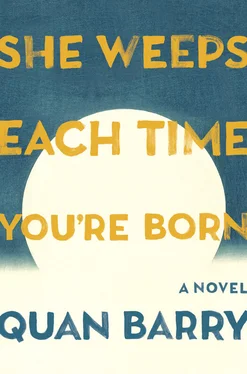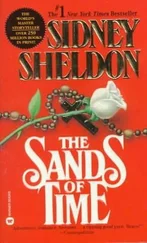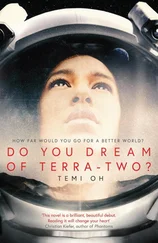Linh reached for Rabbit’s hand. On their way back to the table they passed the tubs with the fish circling in the dark, the sound of the one gasping fish still tinged with the human. You don’t hear the suffering of animals, do you, said Linh. Overhead the moon hung like a mouth. Anyone can hear that, said Rabbit.
When they got back, the others were waiting by the van. Linh pointed to something across the street. What’s that, she said. Viet took a small flashlight out of the glove compartment. Okay, captain, he said, handing it to her as they all crossed the road, Tao with a fresh cigarette clamped between her lips.
The object was perched on a wooden post. Linh turned the light on it. A bat went sailing over their heads. It was a temple the size of a dollhouse, the structure perfect in every detail. Linh ran the light over it. Rabbit could see it was painted with red lacquer and topped with a black tile roof adorned with a stone dragon running along the peak. There were tiny Chinese characters painted over the doors and windows in gold like the temples in Cholon or even like the Temple of Literature in Hanoi. Rabbit looked closer. Inside there was a bowl full of rice and a small trough filled with sand and the charred remnants of joss sticks. Dried husks of a few dead water beetles lay scattered on the polished floor.
Qui clapped her hands together three times and bowed her head. When she finished, she began picking the joss sticks out of the sand and sweeping up the insect husks with her pale fingers. Did someone die here, asked Linh. Rabbit could barely hear the question through the tumult in her head, her ears throbbing. Voice upon voice upon voice. It’s a refuge for wandering ghosts, Viet said. Anyone who dies away from home out in the open. They can come here at night and rest, he added. Qui put a hand out to steady Rabbit. The voices were so loud Rabbit thought her eardrums might burst. She leaned on Qui as they walked back to the van.
Within an hour they came to the Ben Hai. The moon was up, the light shining on the river. A monument stood next to the riverbank, an obelisk recessed in a circle. At the front of the statue a worker stood in a Soviet-style uniform. Let’s keep going, said Linh. Viet looked in the rearview at Rabbit. She nodded. Okay, said Viet. They continued south. The 17th parallel, once everything and nothing, grew distant and farther behind them.
They were coming up on the first stone gate into Hue, the ancient capital. Linh was sleeping in the front seat, in the darkness her face smooth as porcelain. Gently Viet put a hand on her shoulder. The moon gleamed on the Perfume River like a layer of silver. Let her sleep, said Rabbit. The sound of Linh’s breath sawed in and out of her mouth. She should be seeing this, said Viet. All Vietnamese should see the great works of the emperors. There will be plenty to see when we get there, said Rabbit. There will be nothing worth seeing when we get there, Viet mumbled. What, Rabbit said, but he didn’t repeat himself.
They crossed over a narrow bridge and turned left. On the corner a few cyclo drivers were stretched out asleep on their passenger seats. Within minutes the van floated past Flag Tower. The whole structure appeared surprisingly flat like a grounded barge. Even in the night the flag of Vietnam was lit up bright as day. They say that’s the biggest Vietnamese flag in the world, said Viet loudly. There was hardly any breeze. The flag hung limp, but its size was still evident. The one yellow star in the field of red, the sun and the blood of the people.
The ancient Imperial City closed at sundown. Even from the street Rabbit could catch glimpses through openings in the wall that ran the length of it. Most of the buildings had been constructed during the Nguyen Dynasty a few hundred years before. During the war the Vietcong had occupied Hue for four bloody weeks. The American bombings that retook the city destroyed much of it, the Forbidden Purple City completely razed. Recently Hue had been designated a World Heritage Site even though there were places where there was nothing left to see, not even rubble.
They passed another of the grand stone gates leading into the Citadel. It’s magnificent, said Viet. The streets were empty, the stonework adorned with intricate carved designs, mythical animals covered in scales with the haunches of lions and the faces of unicorns. Beyond that is the Forbidden Purple City, said Viet. I hear it was even more beautiful than the one in China. He slowed the van down. It must be more beautiful, he said, because the foreigners call it by its rightful name. Purple after the North Star, which was the Emperor’s celestial home in the sky. Viet’s voice went soft and dreamy. The Forbidden Purple City, his home on earth.
There were women born in the Forbidden Purple City who were never allowed to leave, said Tao. Her intonation was flat, but Rabbit knew rage when she heard it. Through the darkness her words filled the van. Rabbit didn’t turn around to look. She knew if she did, she would see Tao’s face still as an icon, only her lips moving, a lump of gum tucked in her cheek. My great-great-grandmother was one of them, Tao said. A woman with feet small as fists. They say she had to be carried everywhere. Viet stepped on the gas, gunning the engine as if trying to outrun something.
From the backseat Tao kept talking. When the emperor died, his concubines were killed and buried with him, she said. Everything he would need in the afterlife heaped with him in the earth. Trusted advisers. Favorite horses. Even illegitimate children. For a moment Linh shifted in her sleep.
My family comes from the stars, Tao said. I am the last of us on earth. Ridiculous, said Viet. In the rearview Rabbit could see the anger brewing in his eyes. Tao continued untroubled. My great-great-grandfather was a eunuch, she said. As a child, his father didn’t have the money for a surgeon, so he took up the knife himself. In the firelight the boy’s face was stoic even as the sweat dripped down his chin. Afterward his mother rose in the middle of the night and slipped out to the trash heap by the animal pens to find them. She wrapped them up in a soft cloth and placed them in a box, which she gave Great-Great-Grandfather, who kept them through the years as he passed his examinations and was accepted into the imperial household, his body not a threat to the emperor. His mother told him when he died, he would be buried with them. He would be whole.
Rabbit found herself growing sleepy. In the seat next to her Qui had closed her eyes. The van floated along like a boat gliding downstream. They say he loved her from the very moment he saw her, said Tao. The girl with the feet small as fists. They say her feet smelled like roses and that she was the favorite of the man destined to become the sixth emperor of Vietnam. The other girls kept their feet bound and spritzed with cologne to hide the unnatural smell of bloodless flesh, their feet discolored. But Great-Great-Grandmother’s feet were pink as health, her long black hair sweeping the ground when she sat, her tiny feet resplendent as flowers. She never wrapped them a day in her life.
You are ignorant, said Viet. All the old families in Vietnam make outrageous ancestral claims. You lost everything in the war because it was never yours to begin with, he said. Tao continued as if he’d never spoken. He was her attendant, she said. He gave her baths, braided her hair, wrung out her menstrual cloths. One night she caught him staring at her in the mirror as he oiled her shoulders, his eyes burning. I think you are not what you appear to be, said Great-Great-Grandmother. He made his face into a blank slate. If you are honest and hardworking and you believe in something strongly enough, she said, it will come to you. Then she covered her shoulders.
Читать дальше












